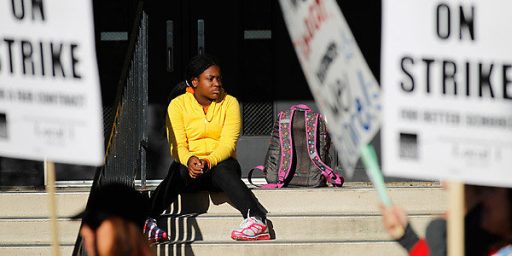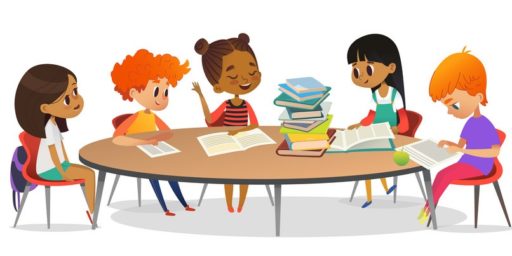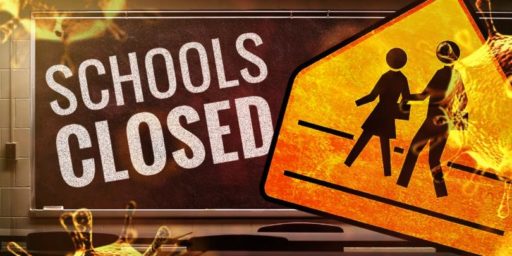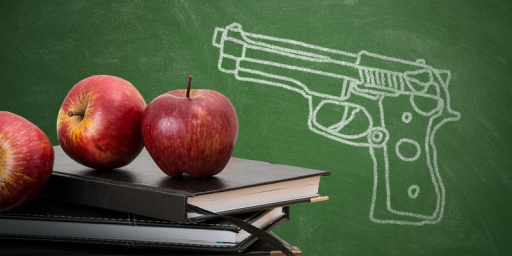Enrollment Drops In Nation’s Largest School Districts, Educators Still Wedded To The Past
As public education continues to wallow in the past, some parents are looking elsewhere for alternatives.
Last week, The New York Times ran a story that got very little notice, but which poses some interesting questions for the future of American public education. Essentially, the report tells us that many large school districts across the United States are noticing a significant drop in enrollment, significant enough that it’s forcing them to cut teachers and other employees:
Enrollment in nearly half of the nation’s largest school districts has dropped steadily over the last five years, triggering school closings that have destabilized neighborhoods, caused layoffs of essential staff and concerns in many cities that the students who remain are some of the neediest and most difficult to educate.
While the losses have been especially steep in long-battered cities like Cleveland and Detroit, enrollment has also fallen significantly in places suffering through the recent economic downturn, like Broward County, Fla., San Bernardino, Calif., and Tucson, according to the latest available data from the Department of Education, analyzed for The New York Times. Urban districts like Philadelphia and Columbus, Ohio, are facing an exodus even as the school-age population has increased.
Enrollment in the New York City schools, the largest district in the country, was flat from 2005 to 2010, but both Chicago and Los Angeles lost students, with declining birthrates and competition from charter schools cited as among the reasons.
Because school financing is often allocated on a per-pupil basis, plummeting enrollment can mean fewer teachers will be needed. But it can also affect the depth of a district’s curriculum, jeopardizing programs in foreign languages, music or art.
While large districts lost students in the 1970s as middle class families left big cities for the suburbs, districts are losing students now for a variety of reasons. The economy and home foreclosure crisis drove some families from one school system into another. Hundreds of children from immigrant families have left districts in Arizona and California as their parents have lost jobs. Legal crackdowns have also prompted many families to return to their home countries.
In some cases, the collapse of housing prices has led homeowners to stay put, making it difficult for new families — and new prospective students — to move in and take their place.
But some say the schools are partly to blame. “We have record-low confidence in our public schools,” said Kevin Johnson, the mayor of Sacramento and head of education policy for the United States Conference of Mayors. (He is married to Michelle Rhee, the lightning rod former chancellor of the Washington public schools and now an advocate for data-driven reform). “If we have high-quality choices in all neighborhoods, you don’t have that exodus taking place,” he said.
The rise of charter schools has accelerated some enrollment declines. The number of students fell about 5 percent in traditional public school districts between 2005 and 2010; by comparison, the number of students in all-charter districts soared by close to 60 percent, according to the Department of Education data. Thousands of students have moved into charter schools in districts with both traditional public and charter schools.
Although the total number of students in charter schools is just 5 percent of all public school children, it has had a striking effect in some cities. In Columbus, Ohio, for example, enrollment in city schools declined by more than 10 percent — or about 6,150 students — between 2005 and 2010, even as charter schools gained close to 9,000 students.
Walter Russell Mead comments:
Although the Times laments the fact that an increasingly competitive education environment is hurting traditional public schools, Via Meadia is more inclined to see this as a positive development. Competition is good. The pressure to compete for students (and their parents) by providing a higher quality education at a lower price is how you light a fire under people to improve the schools.
I agree completely.
For years now, education reform advocates have been talking about the benefits of competition in education. Public education is among the biggest monopolies in the United States. The laws of all 50 states require parents to send their children to school, so it’s a “school mandate” if you will. Anyone running an operation where your customers are required to use your services has very little incentive to consider the views of the customer, be it parent or child, when it comes to how the business is run. Moreover, thanks to organization there are well-healed political entities such as Teacher’s Unions that have the ability to exert far more political influence on legislators and school boards than parents (or students) could ever hope to.
The result is that, notwithstanding all of the hoary rhetoric, it really has never been true in public education that “the children come first.” If that were true, then we wouldn’t have incompetent teachers who are allowed to stay on the job, we wouldn’t have school systems like New York City’s where teachers who have been accused of misconduct are kept in “rubber rooms” and paid their full salary for years, we wouldn’t have appallingly low scores on basic science and math tests compared to the rest of the world. If a student’s education is the product that a school is supposed to be producing, then the school ought to be judged by the product they are producing. If that product is defective, then that’s a pretty clear signal that there’s something wrong with the teachers that were teaching that child. And yet, we hear far too many stories of incompetent teachers who are allowed to continue teaching thanks to the absurd (at least at the K-12 level) idea of tenure. Even more absurdly, when cutbacks are necessary, union contracts often end up requiring the most recently hired teachers to be the one let go regardless of the fact that they might just be the best, most inspiring teachers in the school system. That is not a policy compatible with the idea that the primary concern of the school system is “the children.”
Given all of this, it’s not entirely surprising that parents have been clamoring for decades for other options, whether that might be sending their children to a private or parochial school, or lobbying their local politicians for things like vouchers and charter schools, or even making the commitment to home school their children. Parents can see when their children are being cheated out of a good education, and they want alternatives. The real benefit of alternatives, though, is that they have the potential of actually making public schools better by forcing them to compete or students, and dollars, with other educational alternatives.
Or, at least that’s how it’s supposed to work. As Mead points out, the way that many school systems seem to be reacting to this recent drop-off in enrollment makes no sense whatsoever:
[T]he bureaucracies want to respond by cutting services rather than administrative bloat and high overhead.Via Meadia suggestion: Try reinventing management as a way of saving money before cutting services. Don’t cut foreign language teachers and art class; cut cumbersome work rules, sweetheart purchase agreements, and thin out the layers of patronage appointees who divert resources away from teaching into paper pushing.
That’s a lot to ask of bueraucrats, politicians, and people wedded to the fading image of what public education used to be. However, it’s the proper response to a changing environment and I suspect that those systems that respond properly will succeed while the ones that ignore it will continue to fail and continue to face increased pressure from parents for the right to be able to send their children to institutions that will actually give them the education they’re entitled to.







As you quote, the paragraphs before “but some say the schools are partly to blame” were:
Those do seem like fairly straightforward causes.
And for policy discussions I think I’d prefer wider state-wide, regional, or even national trends.
I love that headline. What’s amazing about it, and terribly ironic, is that you can juxtapose the same concept to all sorts of left-wing fantasies, absurdities and failures.
To wit:
So on, so forth.
In any event, regarding public education, the reality is that when a cesspool is allowed to fester it just makes it that much more difficult to clean up. We’d need radical reforms to fix public education.
First and foremost we need comprehensive voucher programs in all 50 states. We also need to strip public sector teachers of all collective bargaining rights. The NLRA should be rewritten to exempt public sector teachers, and state unionization laws should be preempted in connection with public sector teachers. The public teachers’ unions should be disbanded. Failing that we need right to work laws in all 50 states. Separately we need defined contribution plans, not defined benefit plans, for public sector teachers’ pension programs. We need mandatory retirement laws for public sector teachers. We need at will employment and merit-based compensation for public sector teachers in all 50 states.
In short we need to drain the swamp and to start anew.
Public schools are neither all good, nor all bad.
Here in the San Francisco Bay Area it’s very easy to know where the good public schools are – get out a map, locate the areas where household income is middle to upper middle class and both parents are college-educated professionals, and that is where you will find the best schools. Those schools are characterized by strong parent involvement, and school administrators and teaching staff are held accountable by parents and the school board. White collar middle lass and upper middle class suburbs around the Bay Area have very good public schools.
My wife was a school board trustee in our small local district for 6 years, and her board held our superintendent, principals, and all staff accountable. Involvement was high, school programs were popular, and test scores were very good, kids went off to good colleges all over the country.
Ah, yet another anti-public education diatribe. Are the standard ingredients in place?
* Quote from a source who will personally profit from privatization? Why, Mr. Michelle Rhee, thanks. Shame about the fact that Michelle’s educational “miracles” turned out to be phony, but at least your preferred scapegoats were acceptable.
* Reference to NYC’s (or LA’s) dysfunctional system as a “typical” example for the nation? Very few anti-public education screeds miss this one, though it’s as worthy as insisting Joe Arpaio is a typical police chief.
* Expectation that an entire field live up to a spectacularly unrealistic standard not found anywhere else? Hey, there it is, all over Doug’s 2d and 3d paragraphs. Sure, there are poor teachers, just as there are poor lawyers, bricklayers, clerks, and colonels. There are incompetent people everywhere, but according to this argument, there should only be the perfectly wonderful allowed in education. This is what is called a management problem – there are always policies in place to fire tenured teachers, Doug, but it does require more effort than snarling “You’re fired” over a polished desktop. This leads into No. 4, which is:
* Two rather large blindspots regarding the utility of tenure. Yes, there are “first in, last out” rules, as well as procedural protections for experienced teachers. You might have noticed that state and local governments have drastically cut education funding everywhere (politicians don’t seem to be putting the children first, you see). A district that is in financial distress would have a huge incentive to cut every experienced, highly-degreed teacher they have so as to hire someone at the bottom of the pay scale. Of course, the experienced teacher could take a greatly reduced salary, but only the truly obtuse would believe this would improve the quality of educators.
Add this as well: only a well-financed district (i.e. in high-income districts) would benefit from that system, as only they would be able to afford star teachers. Poor-income districts would be worse off under this system.
The second blindspot is utter faith in principals + school boards. There are protections in place for teachers because believe it or not, there are plenty of incompetent principals and school boards. Without job protection, every area of education, from grades to sports participation, becomes completely politicized. Imagine a teacher with a school board’s relative in the class – without job protection, that kid gets through regardless of merit (kind of like Russert’s kid).
The education issue is a giant one because it involves every aspect of community, small and nationwide. I realize that teachers unions are a favored boogeyman of the neolibertarian sect, but to pin all education problems on them is like blaming only automobiles for global climate change.
The bureaucracies at our schools learned best from our financial sector that you never do this if you can avoid it. Other industries also make great exemplars in this regard.
Not really, no. Having been a kid myself, I can tell you the amount of consumer knowledge of what goes on in education is pretty close to nil outside PTAs. Parents have their preconceived notions of what a good education is, and then if what they’re getting doesn’t live up to it, they complain. The presumption you make gives waaay too much credit to American parents, the same group that a sizable minority of wanted creationism taught as a science.
Stopping formal education at early adulthood will not be an option in the future. Moore’s law assures it. Our public school doors need to swing wide open for all age groups. It sets up a natural mentor path that would cut through a lot of crap, and bequeath actual life skills.
Ongoing education is becoming increasingly less optional. By the hour. Anyone 45 or older feels THAT heat today.
One thing that is not mentioned is that when these large school system were established the average family had between 3 and 4 children now it is less than 2. Fewer students because there are fewer children.
The amount of money spent per student and the number of administrators per student have risen for a long time now and there’s been no corresponding increase in academic achievement. The plans for “reform” from public education’s advocates is more of the same. They either need to get on the ball, or get out of the way.
It isn’t just school systems that need to take this advice. Every single company I’ve ever worked for (all private) had the same exact problem. When revenue and profit drops, you really think that most companies start laying off upper management!? No, they start lay-offs at the bottom rung, and they cut service quality. Management almost never feels pain, unless the company goes under. Give me a break.
In the 1960’s, the “Supreme” Court took the Bible and prayer out of the public schools. That started a decline that continues. The schools today are ran by politicians, judges, and lawyers. The principals and teachers have had their hands tied and are not allowed to discipline. The Federal government has no business in the public schools. They belong to the local communities and states. The governors need to kick the Federal government out of our schools! “Give out Bibles, not birth control devices!”
@Christopher:
So. Explain something to me. We’re getting our asses kicked educationally by Japan, South Korea, France, Sweden. . . Figure they’re all doing lots of Bible reading in their schools?
Or are you just an idiot?
@Christopher:
So, Science and Mathematics won’t be part of school curriculums in “give out Bibles” America?
By the way, I personally do not know of any public school out here in the San Francisco Bay Area that hands out birth control devices, do you?
@Tsar Nicholas:
A spot-on post, Tsar. There are small experiments of alternative education taking place — and for the most part they separate themselves from teacher unions and ‘traditional’ education methods. Even in some of the most desperate demographics, by establishing education emphasizing interesting, updated academics geared for the learning style of a student, and not customized for the political interests of the teacher’s unions, a higher level of learning is attained.
There should be a voucher system giving choice/more options for parents and competition to schools in upping their classroom standards. There also should be some kind of tax deduction given for home schooling and on-line education. While there are lots of ideas circulating out there, most are immediately pushed back by the union establishment .
DM: You really have no clue what you are talking about-go ahead and admit it.
These sorts of analyses that decry administrative bloat inevitably ignore the reality that under currently reporting matrices, secretaries, bus drivers, janitors, lunch ladies, attendance monitors, and compliance personnel for state and federal mandates are all counted under administrative and support staff.
They also ignore the fact that in many jurisdictions, teachers are required to participate in defined benefit plans *in lieu of* Social Security, in order to save school systems from having to make FICA payroll matches. And that defined contribution plans started as a mechanism under IRC Section 403(b) to allow teachers to save their own money in a self directed annuity account to supplement and therefore hedge the risk of relying solely on a single retirement income stream. Goodnes knows your average public school teacher isn’t contributing in order to lower his/her marginal tax rate.
Christopher,
It was not the removal of the Bible and prayer from the schools that lead to their decline but rather the removal was a necessary element of the take over by post-modernism. The Bible is a part of Western Civilization which has been removed from US education. Prayer was simply a mechanism to avoid the debate over the Bible as literary, philosophical and ethical resource.
With the take over by post-modernist thinking, came the demise of classical critical thinking.
Isn’t it interesting that such critical thinking was able to flourish even in society and academia steeped in Christian teachings and the Bible, but now such teachings are feared beyond reason as a threat to the groupthink? But you’ll notice there is no fear of introduction Islam or other religions into the schools, even for field trips to mosques. Partially because of the tradition of memoriter work in Islam, dictation and recitation without thought. Can I get a shout out to the human microphone?
The damage to education from post-modernism was this loss of classical critical thinking which is the first four factors in studying, memorization coming in a distant 5th. We see much talk about freedom of speech, as long as it is the right speech. All the while, the work is done insidiously to deny and damage the freedom of thought.
On the upside, the new critical thinking is well represented among students: Being critical of anyone thinking independently of the group. “One of Us.”
Talk about accountability:
@JKB:
What a really bad idea.
So, the students don’t learn the material, they are admitted to colleges, where – surprise – they have to re-learn the material. And LePage proposes that school districts be required to pay for those students who failed to learn the material the first time around? Just so LePage knows, that means that taxpayers will have to pay more in taxes for his idiocy. This country is becoming more and more stupid by the day.
@al-Ameda:
They could just do something crazy like hold students in a grade until they are qualified to advance. I would say you lose one administrative position for every student needing remedial classes, then the tax payer isn’t charged twice for the school administration’s failure.
I do see several problems with this though. Gaming is very possible. Probably a good first step would be to report those districts that have lots of students needing remedial classes and open them up for vouchers so subsequent parents can save their kids from the obviously failing schools in those districts.
@al-Ameda: It’s probably a bad idea.
It would, though, be nice if a high school degree actually meant something. We need to quit passing kids who can’t meet standards through the system and out into the world. We’re not doing them or our country any favors.
@jan:
I’m fine with the concept of vouchers in the abstract, but I think some troubles are cropping up in practice. Fraud, for instance. When greedy people found schools to skim voucher money it means that government must put more oversight on their voucher programs, adding cost.
That and, we do have the world education rankings. It isn’t like vouchers are out there dominating the results. It’s an untried idea for the most part.
And we should admit that it’s main attraction is “Education, now with more market!”
@JKB:
I have no problem with holding kids back who don’t do the work, don’t pass the classes. Firing an administrator because parents and children don’t care about education? Bad idea.
You want accountability? Link the Governors pension to performance in the schools. Then you might see results.
@jan:
Why should parents be granted a tax deduction for home schooling expenses?
Why should taxpayers subsidize this?
Why should taxpayers pay for on-line education coursework?
I could not claim tax deductions for the college educations of my two daughters, so why carve out an tax exemption for on-line education?
Taxpayers wouldn’t be subsidizing this. Taxes are paid to educate children but if a parent does not use the poor government school but otherwise educates their children, should they pay twice?
Now the issue is, why should I have to pay school taxes at all. My property taxes support failing schools yet, I have no children to use this bad government service and employ no one who might have been educated in they system. I certainly find few graduates of the system whom I can carry on an intelligent conversation with.
@JKB:
Perhaps partially, but school taxes are not a “user fee.” They are charged to people without kids as well, for the purpose of creating an educated citizenry, which benefits us all.
That kinds of leads back to your question though. If a parent is terrible at teaching and does not prepare the child for a modern economy, has the parent satisfied society’s goal?
There are some outstanding schools around here. I have no kids of my own, but I am happy that some of my tax $$$ are going to support this successful government service.
@JKB:
Well, that’s a voucher system. The system that Jan described would carve out a new deduction for home-schooling.
I pay property taxes too, and the schools (K-12) in my area range from good to excellent.
Again, not all public schools are bad, not all are good. Around here school quality correlates directly with increased household income. With regard to K-12 teachers I am in favor of eliminating tenure and replacing it with professional services contracts. I would break-up big city school districts into smaller districts with more accountability – I don’t see any other way out of the dysfunction of the huge poor performing city school districts other than breaking them apart and starting over.
This, ultimately, is what separates good public schools from bad public schools…but rather than addressing this issue, it is just so much easier to rant on about greedy public sector unions…
Well, schools who graduate students how require remedial classes when starting college, are they satisfying societies goal? I’d say parents have far less to account for on the point than the so called “professionals”.
In addition, as the system is set up, an educated citizenry isn’t the goal but one where kids have attended a certain amount of school. Given the current state of education, I’m surprised you can say the goal is an educated citizenry with a straight face.
@Ben:
As someone who has worked in HR for 15 years, I can tell you this is not even close to being the truth. The group that gets hit the hardest is middle management (Director, Jr. Executive level), then front line supervisors, then rank and file employees. It has to do with money. A company can get rid of 15% of middle managers, have minimal impact on the corporation and save millions.
My kids grew up in the late 70s and 80s. What I noticed is that my generation were really lousy parents. I encouraged my kids but most of their friends parents didn’t. I not only worked with my kids on their school work their friends came over for our nightly sessions because their parents couldn’t be bothered. Two years in a row I ran a free workshop for my sons friends to help them with their required science projects. I not only didn’t get any money I didn’t get any thanks from their parents either. As an engineer and scientist I was a natural for this but I had the kids of engineers and scientists in attendance. This was not an inner city community but a middle and upper middle class suburban community. Most of the parents were college educated professionals including teachers. As far as the parents were concerned school was little more than a free daycare service.
Garbage in garbage out.
@al-Ameda: @al-Ameda: If a high school has a health center, they do give out condoms and “family planning” information. Berkeley High’s health center certainly does.
@Ron Beasley:
Yep, I see that today as well.
@Nat:
That being Berkeley, I presume that school parents generally approve of providing family planning information and condoms to students who want that.